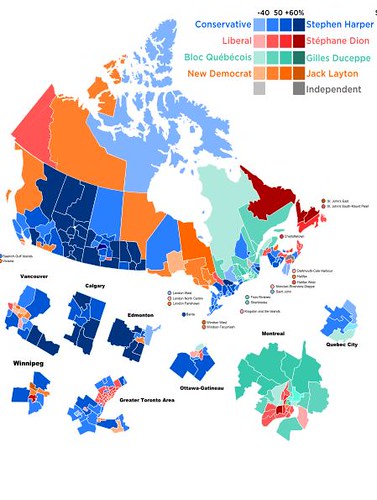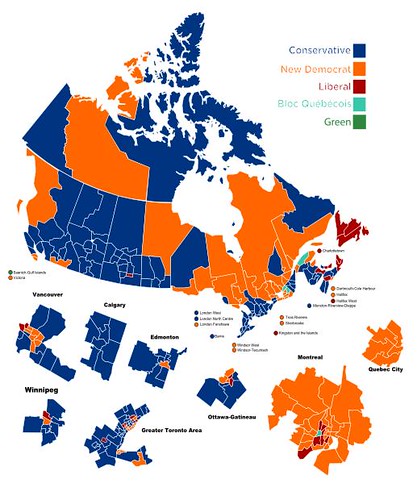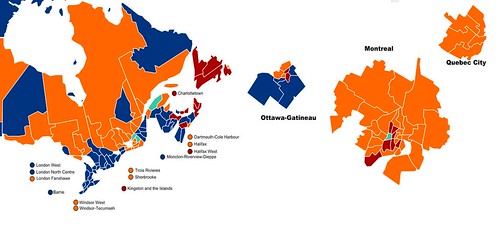
Here is a map showing the results of the 2011 election.

Population changes played a major role in this outcome. Take voter turnout, which rose 2.3% from 59.1% in 2008 to 61.4% this time. The low voter turnout is a major concern for Canadians, but so far no one has come up with a solution. Disenchantment with politics is pervasive.
The NDP made massive gains, going from 36 to 108 seats (by comparison, the previous peak was 43 seats in 1988). Many established parties were displaced. My own downtown Toronto riding of Davenport, represented by Liberal parliamentarians since 1962, switched massively over to the New Democratic Party, the NDP candidate outpolling the Liberal incumbent by 2:1. Davenport, with a large Portuguese-Canadian community, has traditionally voted Liberal. Why the change?
The Davenport riding is in transition. As Portuguese-Canadians become prosperous and move to the suburbs, the gentrification that has taken over The Annex neighbourhood is spreading west into Davenport. Since I've moved here, a townhouse complex has been built on the other side of the street, while an artists' community centre is by the laundry and any number of old storefronts about being converted into residential units.

It may not be that whereas Liberal Mario Silva made his name partly through his aid to immigrants, the NDP's Andrew Cash first came to attention as a punk rocker, then as a journalist for the alternative press. And yes, you probably won't be surprised to hear that I voted NDP myself. I was frustrated with the Liberal Party and wanted a change. Clearly, I was not alone.
One very notable instance of demographics on the election--here, the tendency of Québec to vote as a bloc and to swing massively from one party to another was the massive success enjoyed by the NDP, which crushed the Bloc Québécois and won 58 of the province's 75 seats. By way of comparison, before the election the NDP had only one seat in Québec, in Montréal. Québécois seem to have tired of the Bloc, and voted for the only other party in massive numbers. The NDP didn't have to try: one candidate, a unilingual Anglophone who spent a good part of the campaign in Las Vegas on vacation and hasn't even visited her rising beat a 13 years' incumbent.
What's very interesting about this is that the NDP is now the dominant party of French Canada, not just Québec. I wrote earlier here about the substantial assimilation facing most Francophone populations outside of Québec, but for the time being there are close to a million Francophones in adjacent Ontario and New Brunswick. These populations also voted substantially for the NDP. Taken from Wikimedia here, the below is an edited map showing electoral outcomes in central and eastern Canada, with maps of outcomes in the three Canadian cities with the largest Francophone populations (in descending order, Montréal, Québec City, and Ottawa-Gatineau) added.

Even Francophone neighbourhoods in Ottawa voted for the NDP.
What this means, given the weakness of the governing Conservatives in the province, is that the NDP is the only political party to have large numbers of members in both French Canada and English Canada. If the party can assimilate its new huge cohort, this straddling the language frontier could well make it an inevitable party of government.
Finally, here in Toronto the Conservatives pierced what was once a Liberal stronghold and split the city with the NDP. The first map below shows the situation before the election; the second shows the situation after the election.
![20081014_GTA_results[1]](http://farm6.static.flickr.com/5141/5684385345_c90b9eb30f.jpg)
![201152-2011-GTA-ridings[1]](http://farm6.static.flickr.com/5064/5684385239_773fff858a.jpg)
This division corresponds substantially to the geographical divisions manifested in Toronto's recent mayoral election, where the left-wing George Smitherman held the downtown but the right-wing Rob Ford carried the day with the outer peripheries of the city: as described by the "Three Torontos" paradigm, poorer, more multiethnic, and with more problems about a left-leaning city government that didn't seem to do much for them. These areas traditionally voted Liberal federally--for instance, the Portuguese Canadians--because the Liberal Party is the one responsible for the lifting of discriminatory immigration legislation and the introduction of multicultural policies in the 1970s. As immigrant communities have become larger and more stable, and the Conservative Party has made efforts to appeal through social and economic conservatism, many of their members have switched allegiances to the Conservative Party. While a good marker of assimilation, this is not good for the Liberals.
What does all this mean? Considering the Conservative Party's gains in Ontario, and the NDP's massive success in Québec and substantial improvement in the rest of Canada, the future of the Liberal Party as a potential party of government is in doubt. Without any particularly coherent geographic or communal base and no longer the party of central Canada's cities (and patches elsewhere), how can it succeed? As for Québec, the effective destruction of the Bloc Québécois and the defection of Québécois voters en masse to the federalist NDP may signal significant reverses for the local separatist movement.
It is exciting times for Canadian politics. Demographics both established and changing can be thanked for a good chunk of it.




5 comments:
The fortunes of the BQ don't necessarily correlate with separatist inclinations. For instance, the SNP now has an absolute majority in the Scottish parliament (with 44% of the popular vote in a country with 4 major parties) and is almost certain to hold a referendum on independence, but polls still show a majority of Scots would vote 'no'.
The sudden collapse of the Liberal party is quite something though, given how they have dominated Canada's political history. Then again, Canada's FPTP system rather amplifies swings in the vote. (FPTP amplifies swings in the UK and US as well, but Canada seems to have far fewer 'tribal' voters, as has been seen in several past elections.)
I can see your point, although there is a strong inclination. At certain points I would have been inclined to call the BQ a strong regionalist party, especially if it was involved (as was mooted) with supporting a Liberal-NDP coalition government.
The swings can be notable. At one point in the mid-1990s, a Prince Edward Island election left the legislative assembly dominated entirely by Liberals, with not one Progressive Conservative. In this case, though, it would be safe to say that the Liberal collapse related mostly to the collapse in Liberal support. With Quebec and western Canada lost in the 1980s, immigrant support no longer to be taken for granted, and the massive inroads in Ontario, the future of the party seems open to question.
It's hard to see how the NDP can be called anything other than a Francophone party. Without the French-speaking voters (who, of course, get more than their fair share of seats), the NDP would be to Canada what the Lib Dems are to the UK. Bottom line: there's no governing majority within the NDP coalition. Never will be.
That said, we Americans would never recognize the Canadian Conservatives as "conservative". The are a centrist party as far as we're concerned.
"The Liberal party eliminated discriminatory immigration.."
WRONG!!! Immigration is a privilege, not a right. Canadians were entirerly within their rights in wanting an immigration policy that maintained the racial and ethnic balance of the country. The Liberals just wanted cheap ethnic votes!
Post a Comment